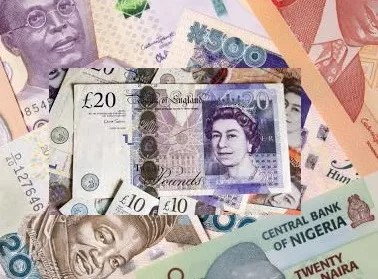The Nigerian Naira has witnessed a significant decline in the parallel market exchange rate, reaching a low point of N2050 per Great Britain Pound (GBP). This downward spiral reflects ongoing demand pressures, which have substantially contributed to the erosion of the currency’s value.
The latest figures indicate a notable decrease of 7.32%, equivalent to N150, compared to the previous day’s rate of N1,900. As of 11:54 am on Tuesday, black-market exchange rates continued to reflect the devaluation trend, presenting a concerning picture for the Nigerian Naira.
Despite concerted efforts by the Central Bank of Nigeria (CBN) to bolster foreign exchange (forex) supply through various policy interventions, challenges persist within the forex market. The Naira has also experienced depreciation against the dollar in the parallel forex market, unofficially trading at N1,630/$1, marking a 1.84% decrease from the previous day’s rate of N1,600. Additionally, the Naira’s weakening trend extended to the Euro, with a 0.57% decrease trading at N1750/EUR1 compared to N1740/EUR1 the day before.
Analysis of Factors Driving Depreciation
Market analysts attribute the recent downturn to a consistent surge in demand for dollars, a trend particularly noticeable since the start of the year. This heightened demand is fueled by various factors, including:
– Increased demand from businesses aiming to replenish stocks or procure raw materials, resulting in a surge in the need for foreign exchange.
– A significant uptick in demand from individuals pursuing overseas education, with expenses such as tuition payments driving the need for dollars.
Financial analysts have underscored the need for a reassessment of policies to safeguard the Nigerian Naira amidst escalating forex rates, despite the Central Bank’s efforts to stabilize its value. The recent devaluation across official and parallel markets has prompted experts to propose measures to mitigate currency volatility and prevent further depreciation.
While acknowledging the positive aspects of recent CBN policies aimed at managing forex market pressures, analysts have highlighted that these measures do not directly address the fundamental issue of limited supply. In response to the sharp decline in the Naira following exchange rate harmonization, analysts advocate for a reassessment of the government’s foreign exchange management strategy. They propose a shift towards a managed float system to enable flexibility in implementing initiatives aimed at bolstering foreign exchange reserves. Such initiatives include increasing oil production, enhancing agricultural exports, and incentivizing foreign remittances.
The situation continues to unfold, with stakeholders closely monitoring developments and awaiting further insights from regulatory bodies and market experts.
Credit: Nairametrics






















